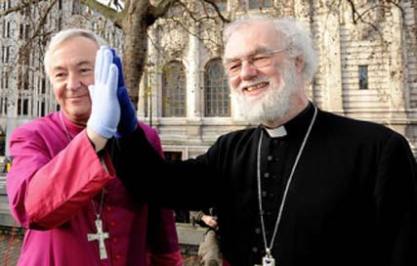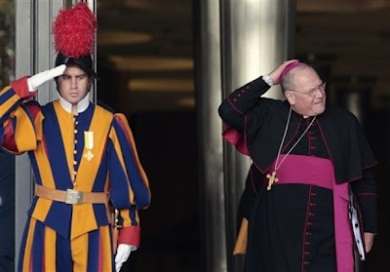As long-time readers will be aware (hello, both of you), I like to try and be charitable towards our spiritual leaders. I mean to say, Rowan Williams comes in for a lot of stick, some of it justified, but it’s impossible not to feel for the guy when you consider the impossible job he has to do, keeping Peter Akinola and Katharine Jefferts Schori at least nominally in the same denomination. Similarly, I’ve been known to wax satirical on occasion about our old friend Cardinal Christoph von Schönborn, but again, when you reflect for a moment on the genuinely appalling state of the Catholic Church in Austria, I think it’s the humane thing to cut the Count a little slack. Not too much though.
So anyway, it’s with something of a heavy heart that I turn to consider Archbishop Vincent Nichols. I say this because I’ve been more than willing to give +Vinnie the benefit of the doubt. I think he’s basically a decent enough chap whose faith is pretty close to that of the Catholics in the pews. More to the point, he comes from outside the Magic Circle and so is in a position to give the Church in England and Wales a sense of direction after a fairly long period of drift. Yet, we haven’t seen much of that. I’ll grant you that he seems to have stamped his authority on the Bishops’ Conference, with one or two exceptions, but having done so, I’m not sure I can see what he wants to do with it.
Perhaps we might say that His Grace’s management style hasn’t necessarily been shown at its best. Nor does it help that his style is very much one of one-man management. Back in Cardinal Cormac’s day, Archbishop’s House used to be a hive of activity. Maybe, given that some of the bright young things around the place didn’t seem to have actual jobs, it would be more accurate to say it seemed like a hive of activity. But some people at least miss the old buzz. Moreover, since Cormac was crafty enough to have other people do the unpopular things, and charming enough to smooth over difficult situations, he didn’t actively create ill will. Vinnie’s tendency to take on everything himself, and the common impression that he doesn’t trust anyone except for Marcus Stock, leaves him dangerously exposed. With the best will in the world, some of his troubles are of his own making.
Let us take, for instance, the long-running saga of Cardinal Vaughan School in west London, the site of a bitter feud between the best Catholic school in England on the one hand, and on the other educational bureaucrats from Westminster diocese who resented it precisely because of its success. Vinnie could quite easily have taken the view that this was a mess he’d inherited from Cormac, and he was going to resolve it to the satisfaction of most people involved. But no, this became a virility test for the diocese. Diocesan manipulation actually became more blatant, putting Vaughan parents’ backs up further. Someone, I know not who, made the inspired decision to send Mgr “Jungle Jim” Curry into a delicate situation, which is a bit like getting a WWE wrestler to negotiate an arms control treaty. In the end, the diocese was put in the mortifying position of having Michael Gove intervene to safeguard the Catholic character of one of its best schools. And even then, we had a stream of claims to the contrary from the diocese, of such an unconvincing character that, my spies tell me, Boris Johnson was expressing concern at fire crews being called out to extinguish conflagrations in the Archbishop’s pants.
But that’s a local matter. It’s the sort of thing that wouldn’t, in normal circumstances, come to the attention of Rome. And this is sort of the crux of the issue. While the Catholic Church is (at least in theory) very centralised doctrinally, it’s very decentralised structurally, and if you spend more than ten minutes in the Catholic blogosphere you’ll find someone complaining bitterly that her bishop isn’t doing what the Pope wants. Actually, there are only two conditions under which a bishop will do what the Pope wants: a) he agrees with what the Pope wants, or b) he’s ambitious and wants to earn brownie points with Rome. Add to that a culture in England and Wales, much of it going back to the late Cardinal Hume, which is distinctly Gallican, holding that we don’t do it that way over here. Well, that can go on for a long time, even decades, but then you’ll sometimes find the wind changing.
One straw in the wind is the continued failure to implement Summorum Pontificum. This isn’t confined to England of course, and it’s notable that nearly five years after publication of this important document, the Vatican website still only has versions in Latin and Hungarian(!) posted. But no, it’s encountered some resistance in these islands. Briefly, as anyone in the LMS could tell you, the CBCEW doesn’t take the PCED seriously, even though the PCED is part of the CDF, which everyone takes seriously. At this point you will say “WTF?”, and rightly so. It’s worth noting, though, that some bishops have been quite helpful in providing for the usus antiquior – not necessarily the most trad-friendly either, but even if they’re doing it to win brownie points, let us not reject the good fruits.
Summorum Pontificum is something that Rome pays attention to, because it’s an initiative of Rome’s and indeed of B16 personally. Something else Rome pays attention to is the Personal Ordinariate of Our Lady of Walsingham. We may note, for instance, that the Ordinariate has been up and running for over a year and still doesn’t have a principal church, despite there being any number of underused Catholic churches in London that could have been pressed into service. The American Ordinariate was only set up this January and had a principal church ready at the outset – a very nice church in Texas – not least because the USCCB was determined it should hit the ground running. And though there are some teething problems with the Australian Ordinariate, I assume it will hit the ground running as well once it’s set up.
There are, of course, a number of reasons why the English and Welsh bishops aren’t too keen on the Ordinariate project. One reason you hear about why they’re dragging their feet on the principal church is that they don’t want the Ordinariate to be too distinctive, even though that’s the whole point of the exercise. There’s also the fear that the Ordinariate may upset the decades-long ARCIC process of agreeable ecumenical tea-drinking with the C of E. Above all, I think, it’s Their Lordships’ ingrained fear and suspicion of something that isn’t under their direct control.
This, in brief, is why, as Dr William Oddie points out, the English bishops sabotaged a similar initiative in the early 1990s. Which in turn is why the Ordinariate project is being run by the CDF in Rome, who didn’t even tell the English bishops until late in the game, precisely because the English bishops couldn’t be relied on not to play silly buggers with it.
Now, as you know, nobody tells me anything. So I have no knowledge of whether or not the CDF have been taking a close look at what’s going on in England. I certainly don’t know one way or the other whether Cardinal Levada is taking an austere view of the English bishops’ foot-dragging over one of Pope Benedict’s pet projects. But I’m fairly sure that these are not the sort of things an archbishop who’d dearly love to be a cardinal would want to be happening.
After all, once the good people at the Palazzo Sant’Uffizio start paying attention to something like the Ordinariate and not being amused at the situation, there’s no telling what they might turn their attention to and not be amused by next. To take a hypothetical example, if a bishops’ conference produces statements on important social issues that are such magnificent edifices of opaque guff as to allow some Milo Minderbinder types to run a cottage industry explaining to the media what Their Lordships really mean, that’s something the CDF might not be amused by. If, to take an even more hypothetical example, a bishop were to have unconvential domestics arrangements that were entirely innocent, but sufficiently well known as to be a source of gossip all over his diocese, that hypothetical occurrence is something the CDF might be even less amused by.
That’s the trouble with the Holy Office. Nobody expects it.

